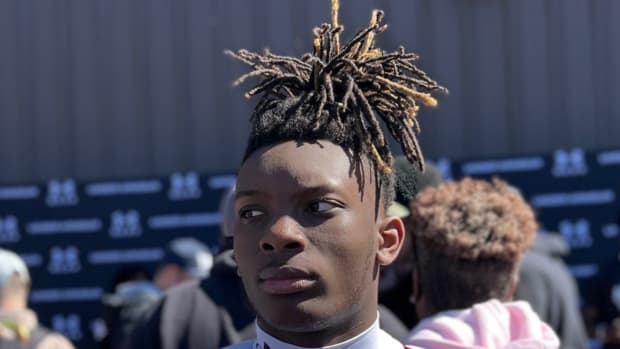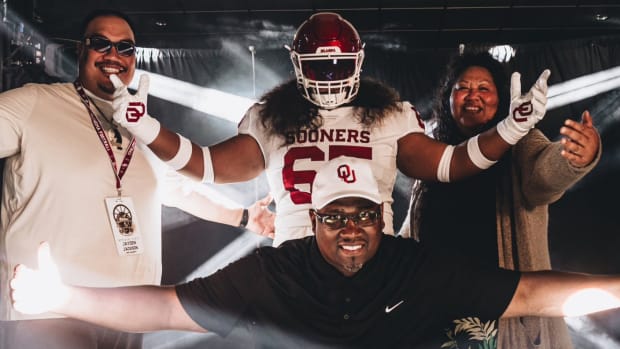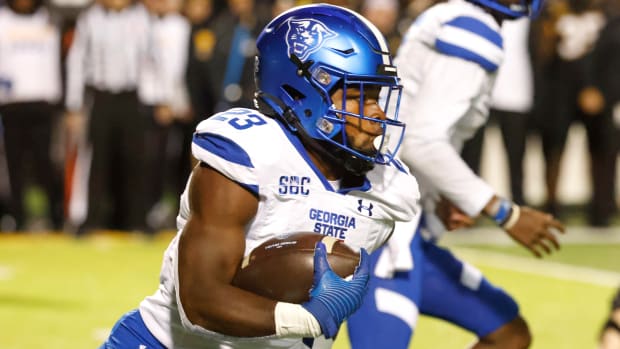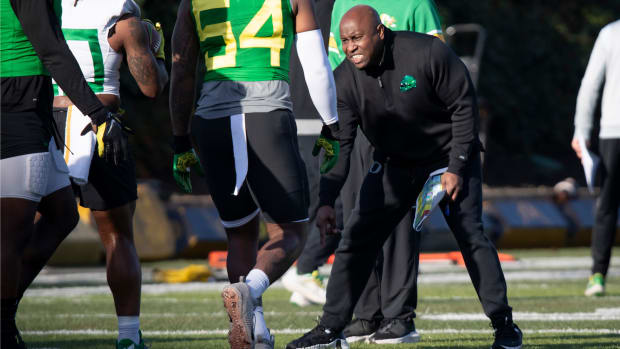Roundtable: Analyzing the second College Football Playoff rankings
With the second round of the College Football Playoff rankings introduced Tuesday evening, SI.com consulted three of its experts -- Ben Glicksman, Martin Rickman and Gabriel Baumgaertner -- to assess the top four, the future implications and the chatter that inevitably accompanies the playoff committee's decision.
Ben Glicksman: After quite a drumbeat of build-up, something only exacerbated by ESPN’s dramatic reveal, we finally have our second College Football Playoff rankings. The top three remain the same as last week, Mississippi State followed by Florida State and Auburn, only we have a new team at No. 4: Oregon, fresh off its 45-16 drubbing of Stanford last Saturday. The Ducks slide into the entirely-hypothetical-but-plenty-controversial-selection-committee-approved playoff bracket and edge out No. 5 Alabama and No. 6 TCU.
• RICKMAN: Florida State jumps back to No. 1 in this week's Power Rankings
We’ll get to the remainder of the rankings below, but let’s start at the top. Martin, is Oregon the most deserving No. 4 selection at this point? And are you OK with Mississippi State holding strong at No. 1?
Martin Rickman: To put it simply: yes and yes. I had Florida State at No. 1 in this week's Power Rankings, but only by the slimmest of margins because I valued the Seminoles’ comeback win at Louisville higher than the Bulldogs' close win over Arkansas, which is still without a conference win. But if you look at résumés, it's close. Mississippi State has wins over LSU and Auburn, which look better by the week. Florida State has victories over Clemson, Notre Dame and Oklahoma State, the latter of which looks worse after the Cowboys' rash of injuries and recent losses.
As for Oregon, I also have the Ducks at No. 4, as I think their win over Michigan State is better than anyone truly realizes. While other contenders leapfrogged the Spartans, who stayed put at No. 8, coach Mark Dantonio’s squad could help Oregon's cause (and its own) by beating No. 14 Ohio State on Saturday. The committee seems to place emphasis on the early-season injury to Ducks left tackle Jake Fisher, which I can appreciate. Oregon has looked like a different team since bolstering its offensive line. The way it manhandled Stanford showed me something. If the Ducks can perform similarly well this weekend at Utah, they’ll only cement their case.
Speaking of big games, what are you looking for this weekend, Gabriel? Which teams can help their cause? And which have the most to lose if they can't get it done?
Gabriel Baumgaertner: The moderate shifts in this week’s rankings entrenched the importance of body of work, which amplifies the excitement for this week’s slate of games. There are three definitive do-or-die games: Kansas State-TCU, Ohio State-Michigan State and, in my eyes, Arizona State-Notre Dame. Add Alabama-LSU and Oregon-Utah to the mix, and that makes five games that could dramatically alter next week’s rankings and flush out a clear top four.
Michigan State and the loser of Kansas State-TCU have the most to lose this weekend given the strength of their résumés among the one-loss teams. It’s also the first opportunity for each (besides TCU) to knock out the high-caliber team that the committee is emphasizing.
Kansas State-TCU is this weekend’s must-watch, pitting No. 6 against No. 7, after all, but I’m awfully intrigued by Arizona State-Notre Dame. Both have outside shots at the playoff but shortages of marquee wins. Now they have the opportunity to boast the résumé builder that they’ll need to elevate them until the end of the season. It is also Arizona State’s biggest home game since Nov. 22, 2007, when No. 11 USC throttled No. 7 Arizona State behind four John David Booty touchdown passes. Notre Dame faces one of its three true road games all season, and some would argue it’s the team’s last chance log a big win. Beating USC and Louisville would be meaningful and impressive, but less so when it’s that opponent's fourth loss. The anticipation behind last week’s Ole Miss-Auburn thriller is now multiplied. The committee has helped that reality, at least.
In thinking about that game, I considered how much, if at all, the committee will weigh major injuries or suspensions. The loss of players like Laquon Treadwell, Kenyan Drake and Todd Gurley have altered the rankings, and, as Martin indicated, the committee appears to accounting for the return of Oregon’s Fisher.
Ben, here’s my question: If a central player to one of the contenders goes down or one returns from injury, should that at all affect the committee’s decision-making process? Do you think it will?
• ELLIS: Bowl Projections: Who's headed to playoff, all other bowls?
Glicksman: Roster injuries and suspensions should certainly come into consideration, but only to an extent. Losing Fisher clearly played a role in Oregon’s 31-24 loss to Arizona on Oct. 2, but most teams deal with significant player absences throughout a given season. Arizona State was without quarterback Taylor Kelly in its 62-27 loss to UCLA on Sept. 25; Georgia was missing Gurley in its 38-20 loss to Florida last Saturday. The committee should weigh extenuating circumstances in losses but not at the expense of identifying similar situations in wins. Florida State beat Clemson 23-17 on Sept. 20 without Jameis Winston. These types of things go both ways.
Moving down the rankings a bit, one other topic that intrigues me is the order of two-loss teams. Ole Miss is the highest-ranking two-loss squad at No. 11, followed by Oklahoma at No. 15, LSU at No. 16, Utah at No. 17 and UCLA at No. 18. This feels like the sort of season in which a two-loss team could be a very legitimate playoff contender, so the order of those programs will be important to monitor. Remember, the committee is tasked with evaluating each team’s résumé from scratch every week. Though there wasn’t a ton of drastic movement this Tuesday, I’ll be interested to see if the committee maintains that order, as was custom in the polls, or if it will be willing to shake things up depending on each team’s caliber of competition.
Along that line of thinking: If Oklahoma beats Baylor this Saturday, or if LSU upends Alabama, would the committee be bold enough to elevate those two-loss teams above several one-loss contenders? What’s your take, Martin?
Rickman: Wow, that's something to think about. Oklahoma has lost two games by a combined five points, but its best win to this point is against West Virginia. With a win over Baylor -- which the committee isn't thinking that highly of despite being a one-loss team with a win over TCU -- movement up the playoff committee's rankings is certainly possible.
The more interesting case, to me, is LSU. The Tigers have losses to two teams in the top four right now and have wins over Wisconsin and Ole Miss. With a win over Alabama, their résumé starts to look like one of those NCAA tournament teams that has a really difficult schedule and is rewarded for it even though it took a few punches. (Think: Michigan State and Tom Izzo.)
Best, worst playoff scenario for each Power Five league; Punt, Pass & Pork
But the question becomes, who will LSU jump? I could see a two-loss LSU team jumping Nebraska, Baylor (even if the Bears beat Oklahoma) or Ohio State potentially (even if the Buckeyes beats Michigan State), but that's about it. The Tigers most certainly won't jump Michigan State (with a win over the Buckeyes) or the winner of Arizona State-Notre Dame.
I'm with you on this though, Ben. A two-loss team is probably going to have a shot if only because there might not be four deserving unbeatens or one-loss teams by season's end. The way teams are dropping games and with so many big matchups left to play, attrition is going to be a serious factor. And we still have a few more weeks of this, not to mention conference championship.
This thing is going to get messy and weird. And college football is a lot better when it's messy and weird.
Baumgaertner: It feels inevitable for at least one two-loss team to get in, right? If Auburn's only two losses are to Alabama and Mississippi State, then why give the benefit of the doubt to Ohio State if its one loss is Virginia Tech?
This is where the feared SEC bias, overblown yet inevitable, will haunt the playoff: if multiple two-loss teams are in contention for the fourth spot. Nobody matches the SEC West's conference play this year. The Pac-12 may have more consistency and the Big 12 more unpredictability, but SEC West teams have faced the most pressure on a weekly basis.
The committee has done an admirable job of evaluating quality games thus far. Like it or not, the SEC likely gets the benefit of the doubt because of its strength at the top.
To echo Martin, let's get messy.




